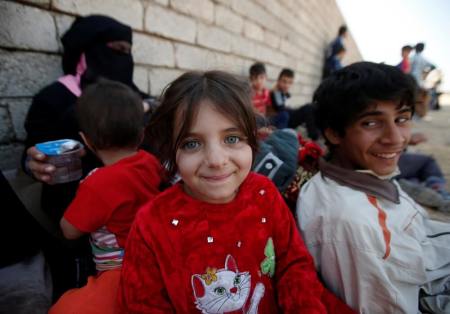Earthquake Hits Iraq Near Iran, Tremors Felt in Israel

BAGHDAD/ERBIL, Iraq (Reuters) - At least four people died in Iraq and several were killed across the border in Iran on Sunday when a strong earthquake hit the region, officials and state media in the two countries said.
The US Geological Survey said the quake measured a magnitude of 7.3, while an Iraqi meteorology official put its magnitude at 6.5 with the epicenter in Penjwin in Sulaimaniyah province in the Kurdistan region close to the main border crossing with Iran.
Kurdish health officials said as well as at least four people being killed there were 50 injured.
Across the border in Iran, state TV said several people were killed and many others injured when at least eight border villages were damaged. Electricity had been cut in the area and rescue teams had been dispatched to the area.
On the Iraqi side, the most extensive damage was in the town of Darbandikhan, 75 kms (47 miles) east of the city of Sulaimaniyah in the semi-autonomous Kurdistan Region. More than 30 people were injured in the town, according to the Kurdish Health Minister Rekawt Hama Rasheed.
"The situation there is very critical," Rasheed told Reuters.
The district's main hospital was severely damaged and had no power, Rasheed said, so the injured were being taken to Sulaimaniyah for treatment. There was extensive structural damage to buildings and homes.
There were reports of injuries in a stretch of cities, towns and rural villages near the Iranian border, including Halabja, Khanaqin and Panjwin.
Residents were keeping away from their homes and sleeping on the streets, several hours after the quake hit.
In Halabja, local officials said that a 12-year-old boy died from an electric shock when an electric cable fell during the earthquake.
Iraq's interior minister ordered civil defense and fire fighting crews to be on high alert after the quake.
In Iran, the earthquake was felt in the capital Tehran. Media gave contradictory casualty figures. Semi-official Fars news agency and state news agency IRNA said at least six people had been killed and many others injured in the border town of Qasr-e Shirin.
But the governor of Qasr-e Shirin, Faramarz Akbari, said only two people had died in the town and 25 others were injured.
"The quake was felt in several Iranian provinces bordering Iraq ... Eight villages were damaged ... Electricity has been cut in some villages and rescue teams have been dispatched to those areas," TV reported.
Semi-official Tasnim news agency quoted an emergency services official as saying there were fears that casualties in villages and small towns could be high.
People were staying out on the streets in towns in the western Kermanshah province because of the threat from aftershocks, a local Red Crescent official told TV.
'DANCING IN THE AIR'
Many residents in the Iraqi capital Baghdad rushed out of houses and tall buildings in panic.
"I was sitting with my kids having dinner and suddenly the building was just dancing in the air," said Majida Ameer, who ran out of her building in the capital's Salihiya district with her three children. "I thought at first that it was a huge bomb. But then I heard everyone around me screaming 'Earthquake!'"
There were similar scenes in Erbil, the capital of the Kurdistan Region, and across other cities in northern Iraq, close to the quake's epicenter.
Iraq's meteorology center advised people to stay away from buildings and not to use elevators, in case of aftershocks.
Residents of Turkey's southeastern city of Diyarbakir also reported feeling a strong tremor, but there were no immediate reports of damage or casualties in the city.
Turkish Red Crescent Chairman Kerem Kinik told broadcaster NTV that Red Crescent teams in Erbil were preparing to go to the site of the earthquake, and that Turkey's national disaster management agency AFAD and National Medical Rescue Teams (UMKE) were also preparing to head into Iraq. AFAD's chairman said the organization was waiting for a reply to its offer for help.
In a tweet, Kinik said the Turkish Red Crescent was gathering 3,000 tents and heaters, 10,000 beds and blankets and moving them towards the Iraqi border.
"We are coordinating with Iranian and Iraqi Red Crescent groups. We are also getting prepared to make deliveries from our northern Iraq Erbil depot," he said.
Israeli media said the quake was felt in many parts of Israel too.





















